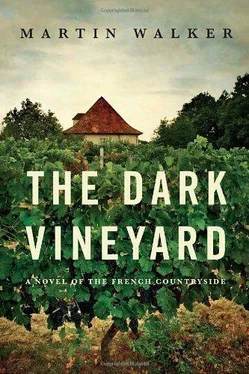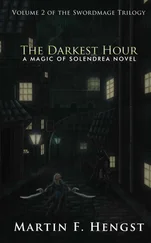Martin Walker - The dark vineyard
Здесь есть возможность читать онлайн «Martin Walker - The dark vineyard» весь текст электронной книги совершенно бесплатно (целиком полную версию без сокращений). В некоторых случаях можно слушать аудио, скачать через торрент в формате fb2 и присутствует краткое содержание. Жанр: Полицейский детектив, на английском языке. Описание произведения, (предисловие) а так же отзывы посетителей доступны на портале библиотеки ЛибКат.
- Название:The dark vineyard
- Автор:
- Жанр:
- Год:неизвестен
- ISBN:нет данных
- Рейтинг книги:5 / 5. Голосов: 1
-
Избранное:Добавить в избранное
- Отзывы:
-
Ваша оценка:
- 100
- 1
- 2
- 3
- 4
- 5
The dark vineyard: краткое содержание, описание и аннотация
Предлагаем к чтению аннотацию, описание, краткое содержание или предисловие (зависит от того, что написал сам автор книги «The dark vineyard»). Если вы не нашли необходимую информацию о книге — напишите в комментариях, мы постараемся отыскать её.
The dark vineyard — читать онлайн бесплатно полную книгу (весь текст) целиком
Ниже представлен текст книги, разбитый по страницам. Система сохранения места последней прочитанной страницы, позволяет с удобством читать онлайн бесплатно книгу «The dark vineyard», без необходимости каждый раз заново искать на чём Вы остановились. Поставьте закладку, и сможете в любой момент перейти на страницу, на которой закончили чтение.
Интервал:
Закладка:
“I miss her,” J-J went on breezily. “My new inspector isn’t much of a replacement. Another woman, but not half so easy on the eyes.”
“You’re not bringing her in on this case?”
“Not yet. We haven’t even gotten a formal notice of arson from the pompiers. But I had one of those discreet calls from Paris just after lunch saying they wanted this sorted out fast. It’s not just their usual worry about eco-saboteurs. There’s some high-level interest pushing this. What can you tell me?”
Bruno related the events of the night, the unusual nature of the water supply, the former ownership by the Ministry of Defense, and finished with a description of the tax and building permit delinquency of the Agricolae company.
“I’m not sure about the eco-saboteurs, though,” he added. “Don’t they usually want publicity and bring along their journalists and cameras?”
J-J shrugged and swirled the ice cube in his glass; he added water and watched his Ricard turn a milky color, then took a healthy sip. “I’ve got a formal letter of request to your mayor from the prefect, asking you to be assigned to the case to lend us poor city flics your local knowledge. So consider yourself conscripted. I’ve got a team up in Perigueux, collating all the names of militant ecolos, and the forensic team from Bergerac will be up at the field by now. What can you tell me about the local ecolos?”
“Nothing special. One was elected to the town council, an elderly hippie named Alphonse who runs a commune in the hills. He’s a sweet man-has a heart of gold, takes in waifs and strays, has been here over thirty years. Then there’s a group that holds protest rallies demanding we close down the local sawmill because of pollution from the chimney. But no real militants. The Greens don’t even get ten percent of the vote, except for Alphonse, and he gets elected because everyone likes the cheese he makes. Let’s go to the fire station and see Albert. He won’t have the lab reports yet but he should be able to give us some idea of whether this really was deliberate or not.”
“Deliberate?” said Fauquet, the cafe owner, who was proud of his reputation for being first to hear all the gossip. He leaned over the counter. “Did you say that the fire might have been deliberate?”
“No, I didn’t say that,” snapped J-J. A big and burly man, whose crumpled appearance concealed his keen brain, J-J could be very intimidating indeed. “And if I hear that you did, I’ll be back here with an army of suspicious health inspectors and a warrant for your arrest. This is serious police business. Do you understand me, monsieur?”
3
Bruno thought “Agricultural Research Station” was a grand name for the modest single-story building that had been erected alongside an old farmhouse on the road to Les Eyzies. Securing the station for Saint-Denis had been one of the mayor’s prouder achievements. It housed four scientists, four technicians and half a dozen locals employed to run the farm and greenhouses. The director and chief scientist, Gustave Petitbon, kept his office in what had been the best room of the old farmhouse. A tall and very thin man with a pronounced stoop, he sat perched on the front of his desk and looked defiantly at the two policemen.
“I can’t tell you what the crop was, not without authorization. It’s a commercial secret,” he said. Bruno knew Petitbon slightly from the few town rugby games Petitbon attended, and from a couple of mayoral receptions, at which Petitbon stood aloof in a corner with a glass of wine. He lived quietly in town with his wife, and they had no children.
“Monsieur Petitbon, I’ve been ordered by the minister of the interior in Paris to conduct this inquiry,” said J-J firmly, his voice starting to grow louder as he went on. “I don’t think that would have happened unless somebody pretty senior in the Ministry of Agriculture, your employer, asked them to get the chief detective of this departement to take charge of the inquiry. I’ve put off one murder, two rapes and a bank robbery to come down here. So rather than waste my time, I suggest you call your ministry in Paris and get whatever authorization you need before I call my ministry and tell them I’m going to arrest you for obstructing my inquiries.”
Petitbon, startled by the volume that J-J’s big frame could generate, went behind his desk to make the call. Then he ostentatiously turned his swivel chair so his back was toward them. He mumbled into the phone and then listened attentively as the voice on the other end of the line barked what sounded like orders. The phone was evidently slammed down at the other end before Petitbon could finish his last deferential “Oui, Monsieur le Directeur.” Petitbon jumped slightly, turned and put the phone down.
“What I am about to tell you must go no further than this room,” he began self-importantly, sitting up very straight. “The crop that was burned was a project of national importance, backed by the Ministry of Agriculture but initiated by the Ministry of Defense. Concern about the implications of climate change led the defense ministry to recommend a special project on drought-resistant crops that might flourish on marginal soil. The project included one pharmaceutical and one agrochemical corporation, and a new company was formed, Agricolae SA, to organize and fund the research. We have been working with a number of crop varieties, soya and other beans, maize and potatoes, some vines. Those were the crops that were destroyed. It is a matter of urgent importance to establish who is responsible, and indeed, who might have known of the project. It was highly confidential.”
Bruno remembered the little flag that he had recovered from the fire station. “So a small metal marker that said ‘Agricolae Sech’ would be yours? I found it at the site.”
“Agricolae Sech -short for Secheresse -that’s the drought-resistant strain we are trying to develop. We have some of the crops on the farm here, but we also wanted to do some tests on marginal soil. That’s why we planted up there on the plateau. And it looks like the crop is all gone, along with a lot of files and research notes. Three years’ work.”
“Do you have any particular reason to think it might have been deliberate?” Bruno asked, keeping his tone light. “Any enemies, aggrieved ex-employees, jealous husbands?”
Petitbon smiled, and his thin, almost severe face became quite pleasant. “I’d prefer the latter. But no, no enemies I can think of, except maybe those crazy eco-saboteur types. Was it arson?”
“We’re waiting for the lab results.”
“Well, I may be able to tell you. We had a webcam set up in the shed, playing back to a computer here at the research station, so we could check rates of growth, color, ripeness and so on. It should also have a record of anybody behaving suspiciously in the field or around the shed, even in low light or at night. We can probably enhance the image a bit.”
“Wouldn’t it have burned? How did you power it?”
“We had a solar panel up there, and that was more than enough. The camera is probably destroyed, but the image will be stored on the computer. I was going to take a look when you arrived.”
“I’m sorry about your three years’ work, monsieur.”
“Thank you. Let’s go over to the lab. That’s where the equipment is.”
“Just one thing,” Bruno added. “These crop varieties you were working on, were they genetically modified, the controversial stuff that people protest against?”
“Of course. That’s why it was all kept confidential. And we made real progress with some of the soybean strains up there.”
“How many people here at the station knew about this project?” J-J asked.
Читать дальшеИнтервал:
Закладка:
Похожие книги на «The dark vineyard»
Представляем Вашему вниманию похожие книги на «The dark vineyard» списком для выбора. Мы отобрали схожую по названию и смыслу литературу в надежде предоставить читателям больше вариантов отыскать новые, интересные, ещё непрочитанные произведения.
Обсуждение, отзывы о книге «The dark vineyard» и просто собственные мнения читателей. Оставьте ваши комментарии, напишите, что Вы думаете о произведении, его смысле или главных героях. Укажите что конкретно понравилось, а что нет, и почему Вы так считаете.












